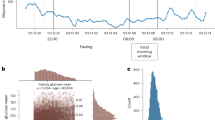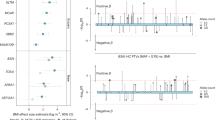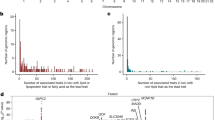Abstract
Objective:
Adipocytokine genes encoding adiponectin (ADIPOQ) and the leptin receptor (LEPR) affect glucose and fatty acid metabolism. The purpose of this study was to examine the association between early-onset type 2 diabetes mellitus (T2DM) and variability within these two genes in the Han Chinese population of Taiwan.
Subjects:
A cross-sectional study of 999 patients from the Han Chinese population of Taiwan with early-onset T2DM (n=264; age at diagnosis, 20 to <45 years) and late-onset T2DM (n=735; age at diagnosis, ⩾45 years) was performed. Blood samples from T2DM patients were taken for DNA extraction, and levels of serological markers were measured at enrollment. Seven single-nucleotide polymorphisms (SNPs) were selected for genotyping (three SNPs in AIDPOQ and four SNPs in LEPR) by polymerase chain reaction in each patient.
Results:
Polymorphisms at the position rs10937273 in ADIPOQ and at the positions rs1892534 and rs2211651 in LEPR were statistically associated with early-onset T2DM (P=0.0246, 0.0014 and 0.0012, respectively). C-reactive protein levels were significantly different among the early-onset T2DM patients with different genotypes at the SNPs rs1892534 and rs2211651 in LEPR (P=0.003 and P=0.004, respectively). In addition, fasting glucose levels were also significantly different among different genotypes at the SNP rs1892534 in LEPR (P=0.038).
Conclusion:
We conclude that the polymorphisms in the adipocytokine genes ADIPOQ and LEPR are significantly associated with the age at diagnosis of T2DM in the Han Chinese population of Taiwan.
This is a preview of subscription content, access via your institution
Access options
Subscribe to this journal
Receive 12 print issues and online access
$259.00 per year
only $21.58 per issue
Buy this article
- Purchase on Springer Link
- Instant access to full article PDF
Prices may be subject to local taxes which are calculated during checkout
Similar content being viewed by others
References
Shaw JE, Sicree RA, Zimmet PZ . Global estimates of the prevalence of diabetes for 2010 and 2030. Diabetes Res Clin Pract 2010; 87: 4–14.
Lammi N, Taskinen O, Moltchanova E, Notkola IL, Eriksson JG, Tuomilehto J et al. A high incidence of type 1 diabetes and an alarming increase in the incidence of type 2 diabetes among young adults in Finland between 1992 and 1996. Diabetologia 2007; 50: 1393–1400.
Ogawa Y, Uchigata Y, Otani T, Iwamoto Y . Proportion of diabetes type in early-onset diabetes in Japan. Diabetes Care 2007; 30: e30.
Tseng CH, Tseng CP, Chong CK, Huang TP, Song YM, Chou CW et al. Increasing incidence of diagnosed type 2 diabetes in Taiwan: analysis of data from a national cohort. Diabetologia 2006; 49: 1755–1760.
Chang CH, Shau WY, Jiang YD, Li HY, Chang TJ, Sheu WH et al. Type 2 diabetes prevalence and incidence among adults in Taiwan during 1999–2004: a national health insurance data set study. Diabet Med 2010; 27: 636–643.
Koopman RJ, Mainous 3rd AG, Diaz VA, Geesey ME . Changes in age at diagnosis of type 2 diabetes mellitus in the United States, 1988–2000. Ann Fam Med 2005; 3: 60–63.
Tsai FJ, Yang CF, Chen CC, Chuang LM, Lu CH, Chang CT et al. A genome-wide association study identifies susceptibility variants for type 2 diabetes in Han Chinese. PLoS Genet 2010; 6: e1000847.
McCarthy MI, Zeggini E . Genome-wide association studies in type 2 diabetes. Curr Diab Rep 2009; 9: 164–171.
Lu Q, Song Y, Wang X, Won S, Cui Y, Elston RC . The effect of multiple genetic variants in predicting the risk of type 2 diabetes. BMC Proc 2009; 3 (Suppl 7): S49.
Lango H, Palmer CN, Morris AD, Zeggini E, Hattersley AT, McCarthy MI et al. Assessing the combined impact of 18 common genetic variants of modest effect sizes on type 2 diabetes risk. Diabetes 2008; 57: 3129–3135.
Menzaghi C, Trischitta V, Doria A . Genetic influences of adiponectin on insulin resistance, type 2 diabetes, and cardiovascular disease. Diabetes 2007; 56: 1198–1209.
Jimenez-Corona A, Rojas R, Gomez-Perez FJ, Aguilar-Salinas CA . Early-onset type 2 diabetes in a Mexican survey: results from the National Health and Nutrition Survey 2006. Salud Publ Mex 2010; 52 (Suppl 1): S27–S35.
Prudente S, Scarpelli D, Chandalia M, Zhang YY, Morini E, Del Guerra S et al. The TRIB3 Q84R polymorphism and risk of early-onset type 2 diabetes. J Clin Endocrinol Metab 2009; 94: 190–196.
Villarreal-Molina MT, Flores-Dorantes MT, Arellano-Campos O, Villalobos-Comparan M, Rodriguez-Cruz M, Miliar-Garcia A et al. Association of the ATP-binding cassette transporter A1 R230C variant with early-onset type 2 diabetes in a Mexican population. Diabetes 2008; 57: 509–513.
Ma L, Hanson RL, Que LN, Guo Y, Kobes S, Bogardus C et al. PCLO variants are nominally associated with early-onset type 2 diabetes and insulin resistance in Pima Indians. Diabetes 2008; 57: 3156–3160.
Gragnoli C . CHOP T/C and C/T haplotypes contribute to early-onset type 2 diabetes in Italians. J Cell Physiol 2008; 217: 291–295.
Tilg H, Moschen AR . Adipocytokines: mediators linking adipose tissue, inflammation and immunity. Nat Rev Immunol 2006; 6: 772–783.
Whitehead JP, Richards AA, Hickman IJ, Macdonald GA, Prins JB . Adiponectin—a key adipokine in the metabolic syndrome. Diabetes Obes Metab 2006; 8: 264–280.
Vionnet N, Hani EH, Dupont S, Gallina S, Francke S, Dotte S et al. Genomewide search for type 2 diabetes-susceptibility genes in French whites: evidence for a novel susceptibility locus for early-onset diabetes on chromosome 3q27-qter and independent replication of a type 2-diabetes locus on chromosome 1q21-q24. Am J Hum Genet 2000; 67: 1470–1480.
Kissebah AH, Sonnenberg GE, Myklebust J, Goldstein M, Broman K, James RG et al. Quantitative trait loci on chromosomes 3 and 17 influence phenotypes of the metabolic syndrome. Proc Natl Acad Sci USA 2000; 97: 14478–14483.
Nawrocki AR, Rajala MW, Tomas E, Pajvani UB, Saha AK, Trumbauer ME et al. Mice lacking adiponectin show decreased hepatic insulin sensitivity and reduced responsiveness to peroxisome proliferator-activated receptor gamma agonists. J Biol Chem 2006; 281: 2654–2660.
Jeon JP, Shim SM, Nam HY, Ryu GM, Hong EJ, Kim HL et al. Copy number variation at leptin receptor gene locus associated with metabolic traits and the risk of type 2 diabetes mellitus. BMC Genomics 2010; 11: 426.
de Luca C, Kowalski TJ, Zhang Y, Elmquist JK, Lee C, Kilimann MW et al. Complete rescue of obesity, diabetes, and infertility in db/db mice by neuron-specific LEPR-B transgenes. J Clin Invest 2005; 115: 3484–3493.
Murugesan D, Arunachalam T, Ramamurthy V, Subramanian S . Association of polymorphisms in leptin receptor gene with obesity and type 2 diabetes in the local population of Coimbatore. Indian J Hum Genet 2010; 16: 72–77.
Han HR, Ryu HJ, Cha HS, Go MJ, Ahn Y, Koo BK et al. Genetic variations in the leptin and leptin receptor genes are associated with type 2 diabetes mellitus and metabolic traits in the Korean female population. Clin Genet 2008; 74: 105–115.
Wauters M, Considine RV, Chagnon M, Mertens I, Rankinen T, Bouchard C et al. Leptin levels, leptin receptor gene polymorphisms, and energy metabolism in women. Obes Res 2002; 10: 394–400.
Sun Q, Cornelis MC, Kraft P, Qi L, van Dam RM, Girman CJ et al. Genome-wide association study identifies polymorphisms in LEPR as determinants of plasma soluble leptin receptor levels. Hum Mol Genet 2010; 19: 1846–1855.
Association AD . Standards of medical care in diabetes—2007. Diabetes Care 2007; 30 (Suppl 1): S4–S41.
Hivert MF, Manning AK, McAteer JB, Florez JC, Dupuis J, Fox CS et al. Common variants in the adiponectin gene (ADIPOQ) associated with plasma adiponectin levels, type 2 diabetes, and diabetes-related quantitative traits: the Framingham Offspring Study. Diabetes 2008; 57: 3353–3359.
Heid IM, Wagner SA, Gohlke H, Iglseder B, Mueller JC, Cip P et al. Genetic architecture of the APM1 gene and its influence on adiponectin plasma levels and parameters of the metabolic syndrome in 1727 healthy Caucasians. Diabetes 2006; 55: 375–384.
Vona-Davis L, Howard-McNatt M, Rose DP . Adiposity, type 2 diabetes and the metabolic syndrome in breast cancer. Obes Rev 2007; 8: 395–408.
Kim JH, Shin HD, Park BL, Cho YM, Kim SY, Lee HK et al. Peroxisome proliferator-activated receptor gamma coactivator 1 alpha promoter polymorphisms are associated with early-onset type 2 diabetes mellitus in the Korean population. Diabetologia 2005; 48: 1323–1330.
Acknowledgements
We gratefully acknowledge the National Research Program for Genomic Medicine from the National Science Council, Taiwan, and the National Clinical Core for Genomic Medicine at Academia Sinica (grant number: NSC96-3112-B-001-010) for providing support services for data coordination, subject recruitment and project management. This study was supported by the Academia Sinica Genomic Medicine Multicenter Study and the National Research Program for Genomic Medicine, National Science Council, Taiwan (National Clinical Core, NSC97-3112-B-001-014 and National Genotyping Center, NSC97-3112-B-001-015).
Author information
Authors and Affiliations
Corresponding author
Ethics declarations
Competing interests
The authors declare no conflict of interest.
Rights and permissions
About this article
Cite this article
Liao, WL., Chen, CC., Chang, CT. et al. Gene polymorphisms of adiponectin and leptin receptor are associated with early onset of type 2 diabetes mellitus in the Taiwanese population. Int J Obes 36, 790–796 (2012). https://doi.org/10.1038/ijo.2011.174
Received:
Revised:
Accepted:
Published:
Issue Date:
DOI: https://doi.org/10.1038/ijo.2011.174
Keywords
This article is cited by
-
Comparison of lipid accumulation product and visceral adiposity index with traditional obesity indices in early-onset type 2 diabetes prediction: a cross-sectional study
Diabetology & Metabolic Syndrome (2023)
-
Association of polymorphisms in LEPR with type 2 diabetes and related metabolic traits in a Chinese population
Lipids in Health and Disease (2018)
-
Association of maternal and fetal LEPR common variants with maternal glycemic traits during pregnancy
Scientific Reports (2017)



